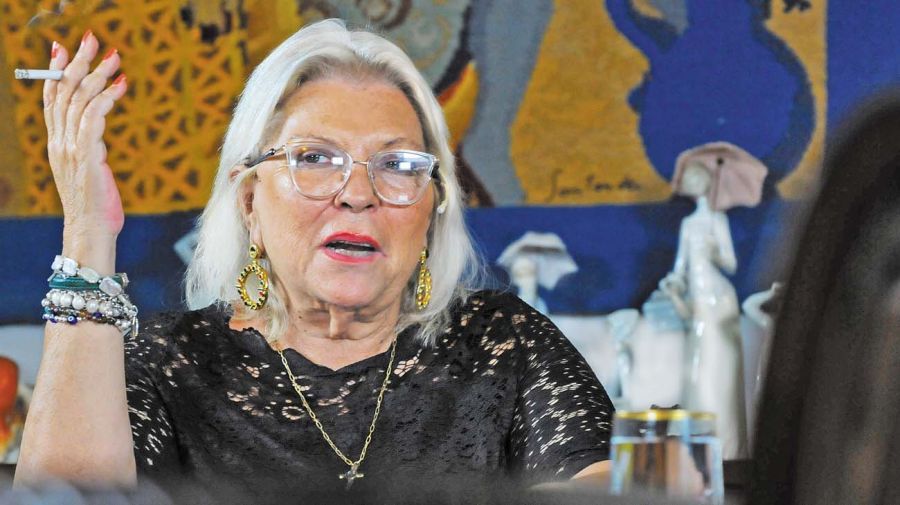Founder of Coalición Cívica-ARI and former national deputy for this City with three presidential runs behind her, Elisa ‘Lilita’ Carrió is one of the most experienced and influential women in Argentine politics.
The protagonist of many controversies, Carrió’s party recently broke with the Hacemos Coalición Federal caucus due to disagreements over the ‘Ley de Bases’/omnibus bill vote.
From her house in Exaltación de la Cruz, Buenos Aires Province, the 67-year-old runs over the events, votes and political personalities which have repeatedly passed through Congress in the last 40 years of Argentine democracy, while announcing her senatorial candidacy next year in an attempted comeback.
Two years ago I did an interview with you in which you said: “The children of Cristina [Fernández de Kirchner] will end up voting for [Javier] Milei.” At that time he was nobody. In that interview I was looking for your capacity to prophesy the future and you were finally right - the children in a figurative sense, the youth with a Kirchnerite upbringing, ended up voting for Milei.
Of course, there is a failure in the hippocampus [Ed.: the cerebral structure found in the temporal lobe whose function is the generation and recovery of memory, helping us to consolidate acquired knowledge or learning, thus forming part of the limbic system] when you do not stop constructing concepts, ideas, memory...
Just slogans.
Just slogans, what is vacated is the capacity to reason with the slogan moving into that vacuum of the hypothalamus. But slogans are a fashion – so that slogan becomes an influencer attracting, above all, the broken kids without mealtime conversation or books in their houses and at times lacking a sense of the meaning of life. They represent not just a resentful society which may be ideologically manipulated but a broken society.
For example, we have Greater Buenos Aires where Milei won a ton of votes. I have often covered those shantytowns and those [better-off] houses in places like Lanús or La Matanza where the children have to play with their toys without going out because they’re fenced in by iron bars. I once dropped by the home of a militant woman there and I told her: “But you’re the prisoners.” As is society as a whole, the kid living inside his home, while those on the outside are prisoners of their condition and tools for organised crime.
So it’s not the kid stealing the car since he doesn’t get to keep it but hands it over to somebody. If they really wanted to control all those bronze and metal robberies, why don’t they go raiding the workshops using metal? Why don’t they look for the highway pirates and drug-traffickers? Why the [underage] instruments? That kid is also outside the social contract. His father may be in prison and his mother simply not there with both losing their sense of the meaning of life.
You speak of a “pandemic of stupidity.”
I lifted that phrase from [Spanish novelist and journalist Arturo] Pérez Reverte, who sees humanity as a pandemic of stupidity because he’s been a war correspondent in places matching up to Viktor Frankl’s book: Man’s search for meaning. The guy was there where empathy and fidelity are still to be found in the mafia or guerrillas because they form part of the very essence of the human condition. That is when he observes a very pampered and easily offended society where the theory of cancellation can extend to altering literature along with the inability to reason – i.e. the impossibility of finding room for reason, which is the true freedom, for example, to reason about the existence of God, which has given rise to enormous and not dogmatic debate because these are major questions. This incapacity has led to the disappearance of such spaces as the Enlightenment, the Renaissance, ancient Greece or ancient Indian philosophy. Where this disappearance leads is to a profoundly infantile society, above all at its highest levels.
I see this in conversations because I have many friends in all levels of life. I see a space populated by “likes,” which is to say a society crystallised in the present without memory or concepts. With only a few exceptions, I miss a class educated in another culture, there is a lack of culture. Now if you descend from that upper-class culture to those who have no class or an ideological culture which has lost its critical faculties, what you have in humanity is a pandemic of stupidity.
Nobody two years ago in April, 2022, was mentioning that Milei could be president, as you also highlighted in that interview ...
The children of Cristina will vote for Milei.
“That a cruel psychopath lacking love would come along.”
Did I say that?
Word for word.
Sure because highly atomised societies without links where the kids are alone, that is the pandemic too. When societies become atomistic and individualistic, lacking any perspective or inner depth, they just don’t know what to do with themselves. You have to have somewhere to express, which could be somebody confined like you. That somebody could be four siblings or four or five dogs – I don’t know exactly how many – [someone] who sees the world from being beaten up as a child but who wants to be rich and famous. Let's not fool ourselves, nobody who is famous does not also want to be rich because that’s where fame comes from. As I see it, they’re all going to be very rich. There I’m reminded of The Serpent’s Egg, the film by [Ingmar] Bergman. This happened in Germany, a broken society which had just experienced hyperinflation where a man was having sexual relations with his extremely young niece, which was obviously a case of terrible abuse, a manipulative man who did not feel German because he was Austrian but he was a great actor in those bars of Munich and nobody got onto him because at the end of the day he gave expression to a broken Germany society and had some culture. And this does not mean comparing him with what they did to the Jews – I’m talking about how the character of dictators is formed, something I study.
Do you find any point of contact in that society which has been breaking down for some time between [Carlos] Menem and Kirchnerism, including the vulgarity of the former?
Yes, the amoral vulgarity. Menem headed an amoral world where there was an extortionate contract: I give you a cheap dollar and make it expensive so that there is a difference and in exchange you let me loot and hand over Argentina. And that contract of stability was an amoral contract because it came with consent to a number of deaths, as told to me by [Menem’s ex-wife] Zulema Yoma, a friend of mine for many years, thrown out by [Andrés] Antonietti.
You mean the presidential security chief at that time.
That blend of eroticism and dance, luxury and vulgarity… yes, that’s what we’re going to see. But that’s also Kirchnerism because look at their whitewash legislation which whitewashes everybody. Anybody who robbed the country is whitewashed in exchange for an investment of US$200 million so that is really the biggest guarantee of impunity. So if you throw in [Supreme Court nominee Ariel] Lijo, you guarantee those who robbed Argentina in the last 30 years entering big business, as some of them indeed have. [Former Interior Minister José Luis] Manzano was Congress caucus chief and today has Edenor [power utility]. So you have a whole lot of money coming back from Panama or the Seychelles, into investment groups behind which there is Argentina’s money, such as the one to whom we owe US$16 billion. They come to invest and buy up Argentina on the cheap.
“I want to appeal to the middle classes to please not to be stupid … we are the fools who pay for the austerity on behalf of the business deals of the mafias … the middle classes should react.”
What does the alliance to come look like if not with Peronists?
Well, that alliance must be constructed but without PRO or the PJ [Partido Justicialista]. I’m not talking about Peronists because there are charming and honest Peronists, I’m talking about the mafia. I identify the PJ with the mafia taking over the country, making everything change to stay the same. When society votes next year, they will evidently realise that they are voting for the same people with whom they are angry, because Milei’s style is also Cristina’s.
In what sense?
That insulting, pugnacious style. Do you remember when he said that he had mastered [Georg Wilhelm Friedrich] Hegel? I laughed so much because it was something he had read off the back cover of a book. Liberalism has nothing of that insulting style.
So do you see Milei winning the 2025 midterms?
I always see the worst of possibilities in terms of a better humanity, a better republic, better institutions. So you always have to reckon with the worst alternative because if you reckon with the best, you’re an optimistic idiot. So I proceed from a society which has problems with its mental health and its hypothalamus but which retains middle-class traditions worth preserving and an identity and I proceed from this society again being deceived by the same [scoundrels] as ever because I see people with whom I shared [a constituent assembly] and battled in 1994. It’s almost historically retrograde.

You grew up as a Radical, what future do you see for them?
In some provinces there is a more decent vision but they are all governed the same way. Some mayors are more decent but looking at the recent voting on the whitewash, I saw people of whom I am very fond because there are moments in life when you know that you have to say ‘no’ because if you don’t know how to say no, you're not an adult. [Max] Weber was wrong when he said that the professional politician should not have convictions – they must have convictions and responsibility. When do you become an adult? When you know how to say no but do you know how to say it to your parents, your children, society or the people?
I have friends who say to me: “Lilita, please don’t speak out.” No, my dear, this might be with your complicity but not with mine. I stay friends with some Kirchnerites because love transcends these issues and ditto for my friends on the right and left, etc. Now if you oblige me to be an accomplice, in whose name? In the name of the majority of the people to scrape 10 more votes. Look, I’m the living image of going up and down the mountain. I can win an election and resign after two years. More like [Unión Cívica Radical founder Leandro N.] Alem, but I don’t care about votes and I’m not going to beg. I neither blow up victory nor am I bothered by defeat.
I think my only defeat was also the best, the 1.8 percent [in the 2011 presidential elections] because that defeat strengthens you, telling you: “It’s you against a people.” Against a people who blindly gave 54 percent backing to Cristina, knowing what kind of person she is. That 1.8 percent against a [Hermes] Binner financed by the government and against Ricardito Alfonsín, who thought that he was [Raúl] Alfonsín. That was a harsh moment because I had won 24 percent [in the previous 2007 presidential election]. Harsh but also revealing because it streamlined the party to those who resisted, to persons steeled by adversity because character is formed in adversity, as are parties. That is why the Radicals are heavily in debt after having splintered too often.
So what future would you assign to the Radicals?
I believe in the republican spirit which Alem and Marcelo T. de Alvear had but not [Hipólito] Yrigoyen – the humanist and republican spirit of Alem, the freedom of expression and the economic and social liberalism of [socialist] Juan B. Justo. Educated men, products of the University of Buenos Aires. You could also throw in [1890-1894 president Carlos] Pellegrini and extraordinary conservatives, such as, for example, [Ramón] Cárcano and [Juan] Bialet Massé, both progressive conservatives made in Córdoba. I am the granddaughter of a progressive conservative and also the daughter of a Radical with military officers in my family. One side of my family goes back to since 1750 in Argentina while another side before 1700. I'm a blonde from Chaco who has lived with and loved Tobas and Wichís… I don’t have the problem of those who believe us to be white when the truth is that we are 80 percent of mixed race. My mum, who is of pure immigrant stock, said: “Where there is wavy hair, there are negros.” That’s very funny because my grandmother’s sisters had white wavy hair so I told them: “There’s a touch of the tarbrush there.” All the great families of Jujuy, Salta and Catamarca are of Jewish origin because they were marrano converts who went out to the Americas. I believe in this pluralistic, free society, never suing a journalist in 30 years and look at the things they’ve said about me.
Speaking of the difference between friends and ideas, you have left the caucus headed by [Miguel Ángel] Pichetto. He speaks very highly of you and I believe that you have spoken very highly of him. Why, what does it all mean?
Well, because I thought that it was a rational form of organising committee work due to the number of deputies we each had. The truth is that we could not have [otherwise] had a voice in the committees and our group of people knew how to read and write [legislation] very well. Pichetto headed one caucus and I another, the second or third in Congress. In those times of Carlos Menem there was a lot of [mutual] respect. Now he is a child of Menem because I know him and have seen him [at work], that’s how we did the Council of Magistrates ruling together. He is a close friend of Eduardo Menem, a legitimate friendship. So at the age of 76 [Ed. - Pichetto is actually 73], he is not going not to help the Menem people because that is what he is all about. He never was a Kirchnerite, what happens is that he always voted for the government. For example, he was always friendly to the CGT and I never was. So it reached a point where dialogue was maintained but our roads bifurcated in the best sense of the word. We cannot enter next year with the electoral confusion of some teaming up with Menem people and others with PRO. No. It is better to maintain the excellent relationship we both have, which is also one of total respect. I hardly speak of Pichetto. I warned him that he was heading for [PASO primary] defeat with [former Buenos Aires City Mayor Horacio Rodríguez] Larreta because I cover the street. In the bunker I went to accompany him first, because I love to accompany the defeated, accompanying Patricia [Bullrich] afterwards. I told him that he was going to have a central role in the upcoming Congress and the truth is that he does. We will continue working with them but we must have our own autonomy to avoid electoral confusion because we’ll be in different places next year.
A year in which you will be a candidate.
If I can overcome the panic which seizes me when I go to the Riobamba and Callao address, yes.
A phobia?
Yes, I come out in spots and I feel sick.
Panic or phobia?
Mediocrity makes me sick, I’ve already realised that, analysing everything. I like to teach.
“When society votes next year, they will evidently realise that they are voting for the same people with whom they are angry, because Milei’s style is also Cristina’s.”
Did coming to live at your new address have to do with leaving Avenida Santa Fe?
Santa Fe was lovely because it was the bar of the entire neighbourhood where I have many friends beyond politics. I have a life of my own, I like the decoration and I like my friends.
Are you going to make a comeback?
For two years with a back-up.
Senator or deputy?
A senator, to keep company.
Which you never wanted.
No, but it’s been more than 30 years since I left Chaco. I never wanted to because I did not want to represent the richest city in the country when I come from Chaco. But after 30 years of living in the Capital... My great-grandmother was named by [Nicolás] Avellaneda and [Domingo Faustino] Sarmiento. Canning and Charcas, Agote and Sustaita, living in Buenos Aires since small.
So now for this City?
Or I could aim for Buenos Aires Province.
How could your candidacy affect PRO in these 2025 elections?
We have and always have had two different votes which could merge. For example, the people of [ex-president Mauricio] Macri. Their problem is with La Libertad Avanza, not me. In certain neighbourhoods of the Capital like Belgrano and Recoleta, etc. Macri and I were tied 30 to 35 percent and then I was ahead in some places, etc. It has always been complementary. Then the Radicals wanted to move in and [Martín] Lousteau came in from the outside but got 12 percent as against 52 percent. Then there was an agreement with Rodríguez Larreta to make Lousteau senator. They all want to dissolve the Coalición Cívica to make more room for themselves, I’ve had that clear for a long time. In electoral seasons I’m the moral reference of the nation but they all want to eliminate the Coalición Cívica, except for drafting [laws] and for donkey work. But there is room for people with spirituality and culture who form part of the great tradition of the public university with a lifestyle. And there are many poor people, many poor women, who identify with me very much because they are decent and would like to progress. I believe that I have less votes among younger men because I’m a feminist without being fanatical and religious without being fanatical because, despite my being such a believer, my party is totally pluralistic because I believe in differences and incarnate them.
A central theme of Milei’s election was gender, which also applies to [Donald] Trump and [Jair] Bolsonaro. There is a male majority voting right or extreme right while on the contrary, there is a trend for women to vote progressive. To what do you attribute that?
Women are less cruel with more empathy and greater intuition. That is because we have different brains and vive la difference. Men are more linear, tougher and more instrumental, the providers in the final analysis but they cut the wood, something of which I would be incapable, So it seems to me that we are different and complementary.
I believe in the difference and I believe in equality. What happens is that there is a sector for the advancement of women. I am a feminist only because of the right of women to be persons because the truth is that quotas had to be guaranteed but I believe that the quota system has gone over the top. I believe in proving one's own worth because I gained my academic chair against 10 males when I was 26. So what has produced the advance of women and all these 2030 policies and eugenics – i.e. not promoting the family or women having children, which spells the fall of Western civilisation? I don’t know if they’ve realised this but civilisation is crumbling because there is no reproduction. Now there are ideological fanatics whom old feminists such as myself have never seen. Furthermore, this is an affront to women because they can now go on a march with their tits hanging out in the air and that is not a march of rights, it is a march of bad taste and vulgarity. So they are fanatics of I don’t know what … the male in this situation feels that all the patriarchal culture transmitted by his mother is falling down because there is a co-responsibility here. In the homes of self-sufficient, intelligent mothers, the children grew up self-sufficient and intelligent too. But the patriarchal culture instilled by the mothers raising them has produced men looking for a direction so I believe that we have to understand that there are two lanes and that we complement each other.
The male must have a place, which will not be the place historically assigned to him by the patriarchal culture in modern times, above all the French Revolution, but he must have a place, a dignity and a value. I believe that the age of the tough guy is over and must give way to a more tender man. The true man and the true woman have something in common which is not erotic love – that something is tenderness. And I believe that the great absence of God in the world, which I criticise because nobody talks about God, is the absence of that tenderness. And where there is no tenderness, there is war, fanaticism and atomisation.
Do you see a process akin to Menem, whose ideas proposed in his campaign were different from those he later carried out?
In a much more atomised, hedonistic and individualistic society, there is no stopping the permanent regression of a certain Argentina. I want to appeal to the middle classes to please not to be stupid. If the middle class always picked up the bill and now [he] comes along saying: “We have to tighten our belts,” but I have been working now for 40 years and every 10 years they send us under! Every 10 years the middle class goes broke and we have to start again. And we are the fools who pay for the austerity on behalf of the business deals of the mafias but the truth is that the middle classes should react, react because the best system for them [the mafias] is a poor class, major mining investments, nouveaux riches and impoverished middle classes. So it is the middle class which is also permitting the poorer classes to rise in number. If the middle classes are eliminated, poverty gives way to destitution, devouring the entire country. And another grave conceptual error of Milei is to say: “The state is an illicit association.” No, sir, the state is a creation of the National Constitution and it was the state which constructed the modern nation. When he vindicates [Julio Argentino] Roca or [Juan Bautista], Alberdi or Sarmiento, he is vindicating the National Constitution and if you vindicate the National Constitution, you are vindicating the social contract and if you vindicate the social contract, you are vindicating the national state which founded public education and the public university.
“I have friends who say to me: ‘Lilita, please don’t speak out.’ No, my dear, this might be with your complicity but not with mine.”
There is no capitalism without a state, you cannot be an anarcho-capitalist, which is an oxymoron.
It’s an oxymoron. Anarcho-capitalism is irresponsible anarchism. But well, he’s not going to be a broken kid but an anarchist. The problem is that we put him in the Presidency and he’s going to resolve in the Presidency what he could not resolve with his father.
Our interview is coming to an end so I’d like to leave you these last few minutes to reflect on whatever you like.
To all the Argentine people, let us not lose the capacity to reason or God, our culture or our language. Cumbia villera songs are OK but we cannot talk like that because without language, there is no imagination. Artificial Intelligence has come along, posing the challenge of annihilating jobs, beginning with the cultural industry, similar to the invention of fire. In consequence, our mediocrity has become our problem. Let us please be aware and not bequeath to our children a lack of culture when we were beneficiaries of an enormous culture in Argentina, please. I see grandchildren who only see Milei’s little games and they are the grandchildren of university professors who were the children of immigrants. Next to our ranch – because I came from a wealthy family, and I’d like to end on that note – there were smallholdings of five to 10 hectares owned by Czech, Montenegrin, etc. immigrants. We went there, my father and I, on horseback to eat fried eggs and the children of all those 10-hectare families went to university, they’re doctors, lawyers and vets and the current governor of Chaco, an architect, is descended from those families. That is Argentina, make no mistake about it. And it is also true that I see many people studying in the universities of Greater Buenos Aires, despite the dogmas there, doing postgraduate degrees and improving their standard of living. I see growth, despite all the criticisms: there is an access to education in order not to fall into worse poverty while the worst poverty is that of the spirit.
Production: Melody Acosta Rizza & Sol Bacigalupo.

























Comments